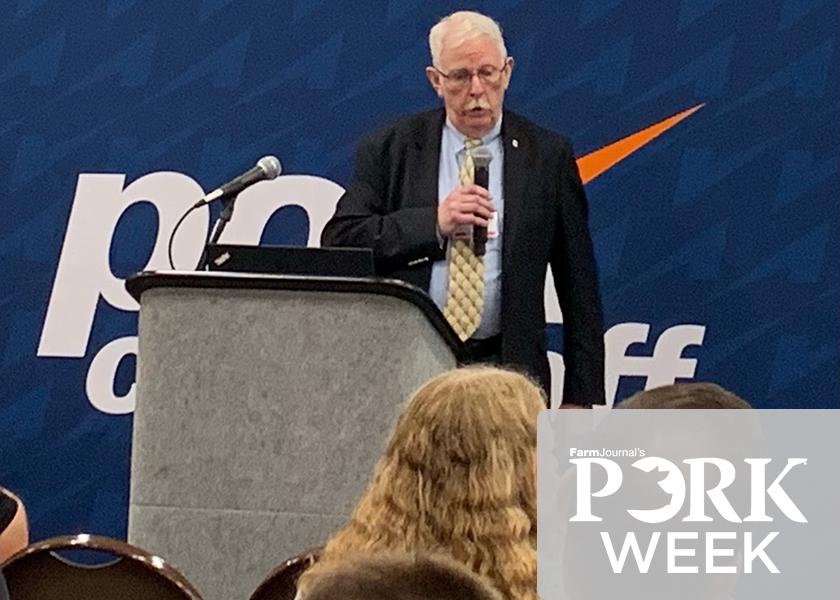Who Will Work on Our Farms?

Labor continues to rank as one of the top issues facing U.S. pork producers, says Kerry Scott, a program manager for másLabor. During a session at the 2021 World Pork Expo, he shared a number of programs that may help producers acquire the help they need in the future.
The interactive session expanded on experiences from producers in the room who use existing worker programs. One producer has used the H2A program extensively (utilizing workers from 24 countries and 6 continents). However, this program is more geared toward seasonal agriculture rather than production livestock agriculture.
Clearly, the program needs to be updated, Scott points out. During World War II, everyone left the farms to help in the war effort. But when they came home, they didn’t go back to farming. More than 2 million people to brought in to work on farms and after the war, many of them stayed.
“About 1984, we sent a lot of them home but they came back,” Scott says. “So, in 1986, government did manage to create labor-related legislation that solidified the H2A and H2B programs. In 1986, the government determined the need for visas to be 66,000. That’s about a third of what’s needed now.”
TN Visa Program
The TN Visa program has gone well, but the problem is getting into the embassies to get the visas, noted one of the producers in the room. Producers are bringing workers in under the code of either veterinary or animal breeders/animal scientists. They noted that last year was particularly tough because of the COVID-19 outbreak but since then, the process has been relatively fluid.
“The TN program is exclusively for Mexico and Canada, and 93 percent of the workers come in from Mexico,” Scott says.
With this program, workers can work 10 months of the year and must be off for 2 months, and they can follow this protocol for the rest of their working lives, Scott says. It’s been gratifying to see thats the third generation of some families are here, he added.
Exchange Visitor Visa
The J1 visa program, or exchange visitor visa, is run by the State Department, which Scott considers a benefit. It is a student and intern program, which means these employees are limited to a one-year stay. In theory, these people should be learning all aspects of an operation, because the purpose of the program is for them to take the knowledge they gain in the U.S. and implement it back in their own country, Scott says.
Two of the producers attending the session have had quite a few returning J1s after 18 months to 2 years.
Illegal Immigrants
Though no one wants to talk about undocumented workers, Scott says it’s a “necessary evil.”
“When we gave amnesty in 1986, illegal immigrants suddenly had choices and their loyalty disappeared,” Scott says. “You may be able to fill labor gaps for a year or two but eventually these people will move on the other jobs.”
A bill in Congress to address helping immigrants move from undocumented to documented has passed the House twice but has been languishing in the Senate, Scott says. The bill would allow workers to be here with a blue card and would also allow H2As to come to agriculture. He predicts it will eventually pass.
“Everyone will be seen as a refugee and offered status here,” he says, but he doesn’t agree with that approach. “We should be offering amnesty to others who’ve risked their lives for this country.
Several producers emphasized the importance of talking with legislators about the need for an H2A program in agriculture.
Consider an agent
The company Scott works for is one of the nation’s largest suppliers of legal guest workers with a staff of attorneys who are kept busy representing producers.
When the government starts making physical visits, “they’ll out-brief you with the horrible things you’ve done” and present a producer with a whopping list of discrepancies. His company’s job is to write a response to the audit report and show the government how the producer is in compliance. In other words, it might be valuable for larger producers who hire many workers to have an agent or company working on their behalf, particularly in an audit situation. Most employers are just going to bite the bullet and pay the fine, Scott says.
We will be uniting together June 7-13 for PORK Week across all of our Farm Journal platforms to elevate the important role the pork industry plays in feeding the world. Share your stories and post photos on social media using #PORKWeek21 to help us honor the pork industry. From “AgDay TV” to “AgriTalk” to “U.S. Farm Report” to PorkBusiness.com and everything in between, tune in and join us as we acknowledge the most noble profession there is: feeding people.
More from Farm Journal's PORK:
Economists Call Out Game Changers in the Pork Outlook
Farm Journal Live: World Pork Expo is Back!







